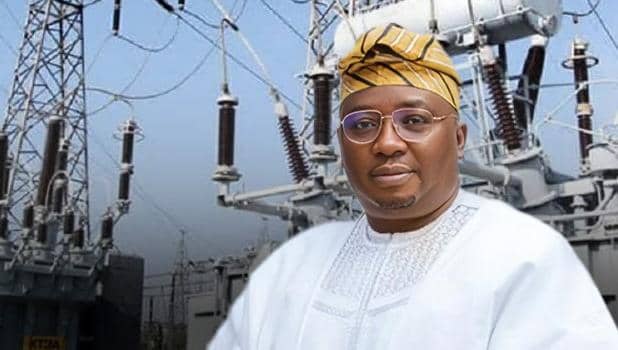Nigerians have expressed outrage over the Federal Government’s latest indication of an impending electricity tariff hike, as the Minister of Power, Adebayo Adelabu, revealed plans to transition the sector to a cost-reflective tariff regime in a bid to stem the country’s mounting power sector debt, which now stands at N4 trillion as of December 2024.
Speaking during the Mission 300 Stakeholders’ Engagement Meeting in Abuja, Adelabu said the move is part of broader reforms aimed at placing the power sector on a sustainable and bankable path.
“Currently, there’s a huge outstanding debt to the power generation companies in the form of unpaid government subsidies which stands at about N4trn as of December 2024,” Adelabu stated.
He disclosed that the government intends to end the electricity subsidy regime and implement targeted subsidies for economically vulnerable Nigerians, as a way of easing the burden on public finances.
“The Federal Government is already working out modalities to defray this obligation… and ensure that further obligations are not accrued going forward,” he added.
Electricity Consumers Cry Foul
The announcement has drawn strong criticism from electricity consumers and civil society groups, who argue that the hike would be unjustifiable given the poor service delivery, frequent blackouts, and lack of infrastructure upgrades.
Kunle Olubiyo, President of the Nigeria Consumer Protection Network, warned that any increment without corresponding service improvement would amount to “fleecing” consumers.
“If you increase across boards, what assurance will there be of cost-reflective service?” Olubiyo asked.
“Between 2015 to date, we’ve only added 400 megawatts… and now, we’ve not been able to hit 600 megawatts since Jonathan left office.”
He emphasized that government decisions should reflect political sensitivity and not come at the expense of citizens already grappling with economic hardship.
“The bullets should not be fired simultaneously… tariffs should not be at the expense of service level agreements,” he warned.
Sector Faces Liquidity, Investment Crisis
Bode Fadipe, CEO of Sage Consulting & Communications, noted that while liquidity remains a major challenge, the focus should not only be on pricing.
“Is cost reflectivity alone going to bring about the transformation we all desire?” he asked.
“We must stop concentrating only on cost. Why are we not addressing the other issues—policy issues for instance—that are plaguing the sector?”
He also questioned why customers on Band A, who pay for over 20 hours of power supply daily, are still not receiving commensurate service.
“When you look at it that way, you begin to wonder whether another adjustment will really solve the problem,” he said.
Consumers on Lower Bands Suffer the Most
For many average Nigerians, even the existing tariffs do not reflect service realities.
Abubakar Aliyu, a Band C consumer from Gwagwalada, Abuja, lamented the irregular power supply in his area.
“I get less than 6 hours of electricity daily, and some days, we are in total darkness. This move will be very bad as we all know how poor the DisCos are in terms of service delivery,” he said.
Tariff Breakdown
Data from the Nigeria Electricity Regulatory Commission (NERC) show that current cost-reflective tariffs far exceed what consumers are charged. For instance:
Band A (Non-MD): N231.79 (cost-reflective) vs N209.50 (allowed tariff)
Band B (Non-MD): N223.94 vs N68.96
Band C (Non-MD): N209.32 vs N56.38
Band D (Non-MD): N164.34 vs N39.67
Band E (Non-MD): N145.07 vs N39.44
This shows significant government subsidization, particularly for Bands B to E, which serve the majority of low-income earners.
Government’s Broader Reform Agenda
According to a statement by the minister’s aide, Bolaji Tunji, the ministry’s priorities include:
Recovering idle generation capacity
Expanding the national energy mix with renewable sources
Strengthening transmission infrastructure
Stabilizing the national grid
Expanding rural electrification and energy access
Finance Minister Wale Edun, speaking via Zoom from Brazil, echoed Adelabu’s position, saying the power sector reforms would unlock Nigeria’s economic potential and lead to job creation.
“We’ve seen over 40 percent increase in power distribution in the first quarter of 2025 due to the reforms,” Edun claimed.
Despite the promises, consumers say unless service improves, the push toward higher tariffs will remain a hard sell.
“Even if the government wants to increase the tariff, they should ensure everything is in order first,” said Aliyu.
“The DisCos can’t even repair faults on time. How then can we justify paying more?”
WARNING: If You Are Not 18+, Don’t Click The Link Below 👇🫣
https://abnormalitylovingmammal.com/kx6iepv2qm?key=6c14bd1d68e1eba721851f19778f5efe
https://poawooptugroo.com/4/8902554
Please don’t forget to “Allow the notification” so you will be the first to get our gist when we publish it.
Drop your comment in the section below, and don’t forget to share the post.
Never Miss A Single News Or Gist, Kindly Join Us On WhatsApp Channel:
https://whatsapp.com/channel/0029Vad8g81Eawdsio6INn3B
Telegram Channel:
https://t.me/gistsmateNG





We feel Discos improving to previous generation. it fact we citizens have to pay for service, but too much hike can chase customers.